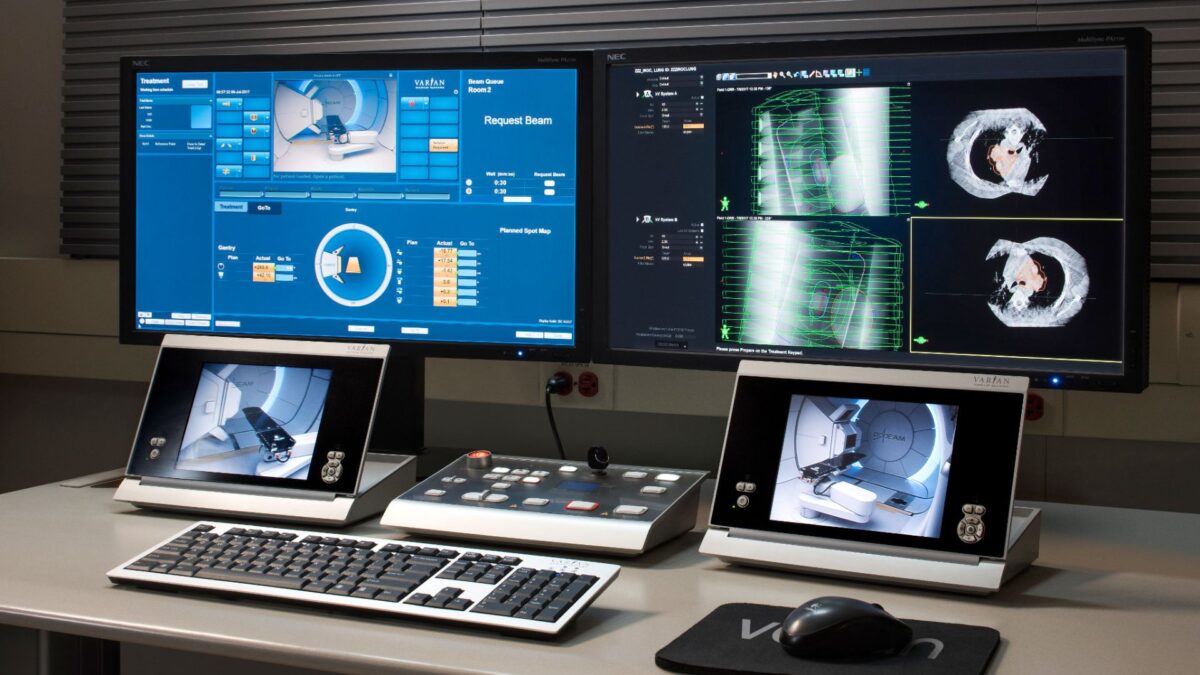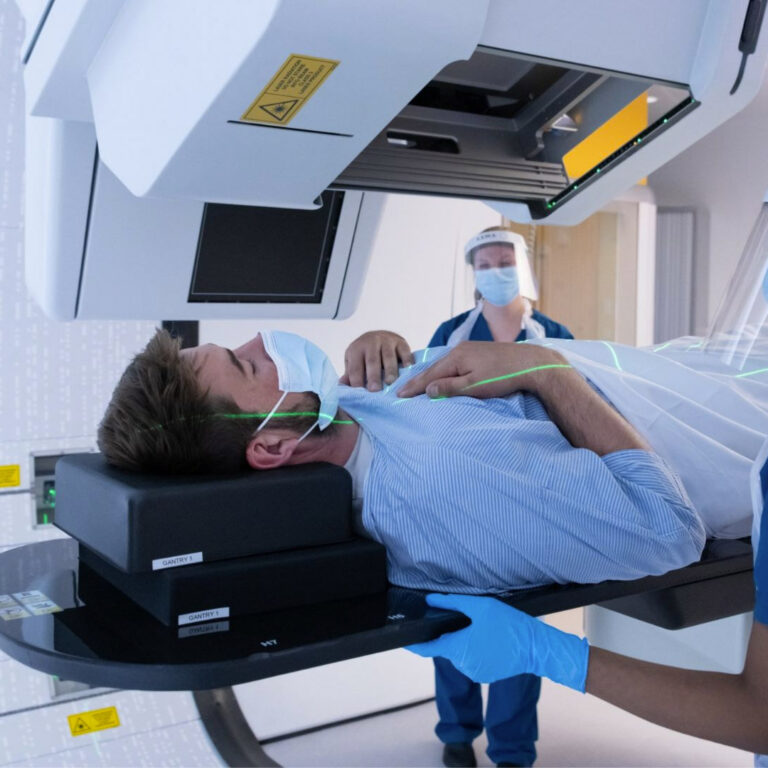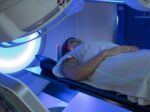Globally, the month of July is acknowledged as Sarcoma Awareness Month, a time dedicated to increasing awareness about sarcoma and the treatment options available.
Sarcoma Awareness Month serves as an important opportunity to educate and inform people about this rare form of cancer and the importance of early detection and diagnosis, treatment options, and care.
Along with the world-leading cancer clinicians at Proton International London and our extended team at UCLH London, we want to take this opportunity to highlight in this article the latest advances in sarcoma research and new treatment options available.
Are sarcomas difficult to treat?
Sarcomas are rare types of cancer that originate from the body’s connective tissues, such as bones, muscles, tendons, cartilage, and fat.
The treatment approach for sarcomas is tailored to each individual based on factors such as the type, stage, and location of the cancer. A dedicated multidisciplinary healthcare team specialising in sarcoma will collaborate to develop a personalised treatment plan for every patient diagnosed with sarcoma.
Treatment may involve a combination of approaches, including surgery, radiation therapy (which may include advanced techniques like proton beam therapy), chemotherapy, and targeted therapy. By considering the unique characteristics of the sarcoma and the specific needs of the patient, the healthcare team aims to optimise the effectiveness of the treatment while minimising potential side effects.
If the sarcoma is found at an early stage and has not spread from where it originally started, surgical treatment can be very effective in treating sarcoma. If the sarcoma has spread to other parts of the body, treatment may be focused on reducing the size and effect of the tumour as opposed to curing it.
Early diagnosis really is key.
What advances in research have there been in sarcoma treatment?
Sarcomas are hard to understand and treat, and outcomes for patients with advanced disease remain poor.
With a growing global network, specialist clinicians and scientists are continually forging new collaborations and opening up fresh avenues for research and treatment of sarcomas.
The sarcoma specialists at Proton International London are committed to working to learn more about sarcoma, finding ways to prevent it, how to best treat it, and how to provide the best care to people diagnosed with this disease.

Recent advances in research include:
New drugs and targeted therapies
The most effective drug for the treatment of patients with advanced sarcoma, doxorubicin, is a cytotoxic chemotherapy drug that was approved in 1975. Despite how long it has been used, it remains a very important drug in the treatment of bone and soft tissue sarcomas.
However, pharmaceutical companies across the globe are committed to ongoing active research into new medications, in particular more targeted therapies, that may be effective in treating subtypes of bone and soft-tissue sarcoma, as it is recognised that there is still a lot or progress to be made.
For example, as quoted in an article in Forbes, “Boehringer Ingelheim is studying the precision drug candidate BI 907828 that targets a pathway selectively activated in another major sarcoma subtype, liposarcoma (a sarcoma originating from fat cells), in the Phase 2/3 Brightline-1 trial that is designed to prolong survival compared to doxorubicin. In addition, Inhibrx is studying a precision drug candidate INBRX-109 in the sarcoma subtype chondrosarcoma (a sarcoma originating from cartilage cells) in another Phase 3 trial (called ChonDRAgon).”
These are just two examples of several new drugs being investigated for both bone and soft tissue sarcomas.
Immunotherapy
Immunotherapy uses the body’s immune system to find and attack cancer cells. While immunotherapy has revolutionised how some tumour types are treated, according to the European Society of Medical Oncology research and clinical trials around its use in treating sarcomas are late in coming, however, there have been some early successes in clinical trials using immunotherapy in sarcomas.
Genomic profiling
In the UK, genomic testing is available for all newly diagnosed sarcoma patients. Genomic testing can help diagnose sarcomas and helps identify the DNA alterations that may be driving the growth of sarcoma. Information about genomic mutations may help doctors identify treatments designed to target those mutations.
How is research carried out for different sarcoma subtypes?
Research for different sarcoma subtypes is typically carried out through a multidisciplinary approach involving various methods and collaborations among researchers, scientists, clinicians, and institutions.
Common ways research is conducted for different sarcoma subtypes include tissue analysis and preclinical studies in the laboratory, and clinical trials which allow patients the opportunity to try new drugs under strictly controlled conditions, and for researchers to learn about their effectiveness and side effects.
Research for different sarcoma subtypes is an ongoing and dynamic process. It involves a combination of laboratory experiments, clinical studies, collaborations between researchers nationally and internationally, and data analysis to deepen our understanding of these rare cancers and improve treatment options for patients
What new treatment options are there for sarcomas?
Proton beam therapy
Proton beam therapy is a type of radiotherapy that is considered a good treatment option for certain types of sarcomas for several reasons:
- Precise targeting: Proton beams can be precisely aimed and controlled to deliver radiation to cancer cells of a tumour while sparing surrounding healthy tissue, which is important if sarcomas are close to critical structures.
- Reduced side effects: By sparing healthy tissue, proton beam therapy can potentially reduce the risk of side effects and improve outcomes for patients.
- High dose delivery: Proton beams can deliver a high dose of radiation directly to the tumour.
- Favourable outcomes: Early studies suggest that PBT can result in high rates of tumour control and fewer side effects for certain types of sarcomas.
Proton beam therapy targets and destroys cancer cells using high-energy protons as opposed to X-rays (photons) or other high-energy radiation sources.
Combination therapies
Studies and clinical trials on immuno-radiotherapy for the treatment of sarcomas are in preliminary stages. Recent studies suggest immuno-radiotherapy may benefit patients with subtypes of sarcomas that are sensitive to immunotherapy and/or radiotherapy.
Although there are problems that still need to be studied, the results of early clinical trials suggest that immuno-radiotherapy has a positive effect on the treatment of soft tissue sarcomas.
How will these advances in sarcoma research help you?
The ongoing commitment to improving the efficacy of the treatment of sarcomas is all centred around improving the quality of life and life expectancy for patients diagnosed with sarcoma.
What is a clinical trial and can anyone with a sarcoma diagnosis sign up for a clinical trial?
Clinical trials are essential medical research studies that aim to thoroughly test and evaluate new treatments before they can be made widely available.

The journey of a potential new treatment starts in the laboratory, where researchers conduct initial tests to assess its effectiveness and safety. If the results show promise, the treatment then progresses to carefully designed trials involving people.
During these trials, participants receive the new treatment under close observation by a team of healthcare professionals. The purpose is to gather data on its efficacy, potential side effects, and overall impact on patients’ well-being.
By participating in clinical trials, you play a crucial role in advancing medical knowledge and improving future treatments for a variety of conditions. Your participation contributes to the development of safer and more effective therapies that can benefit not only yourself but also countless others in need.
If you have been diagnosed with sarcomas and are willing and/or considering joining a clinical trial, you need to be referred by your clinician. If they believe a trial is considered appropriate for you, your clinician can contact the team running the trial on your behalf. They will be able to find out more information about the trial and your eligibility to join.
A full list of UK clinical trials relating to sarcomas is listed on the Sarcoma UK and Cancer Research websites.
To find out more about proton beam therapy as a treatment for sarcoma, contact Proton International London
At Proton International London Private Sarcoma Service, we specialise in treating bone and soft tissue sarcomas using proton beam therapy (PBT).
Our highly respected sarcoma oncologists work in conjunction with our first-class clinical colleagues at UCLH NHS Foundation Trust and UCLH Private Healthcare.
They have a strong interest in clinical research and provide a comprehensive and high-quality service to patients with a variety of cancers. They have extensive experience in treating sarcomas and offer proton beam therapy as a unique treatment option in the UK.
Contact us today to find out more.

This article has been clinically reviewed by Proton International Medical Director and Consultant Clinical Oncologist, Dr Beatrice Seddon. Dr Seddon specialises in the use of radiotherapy (including proton beam therapy) and chemotherapy for the management of soft tissue and bone sarcomas.





